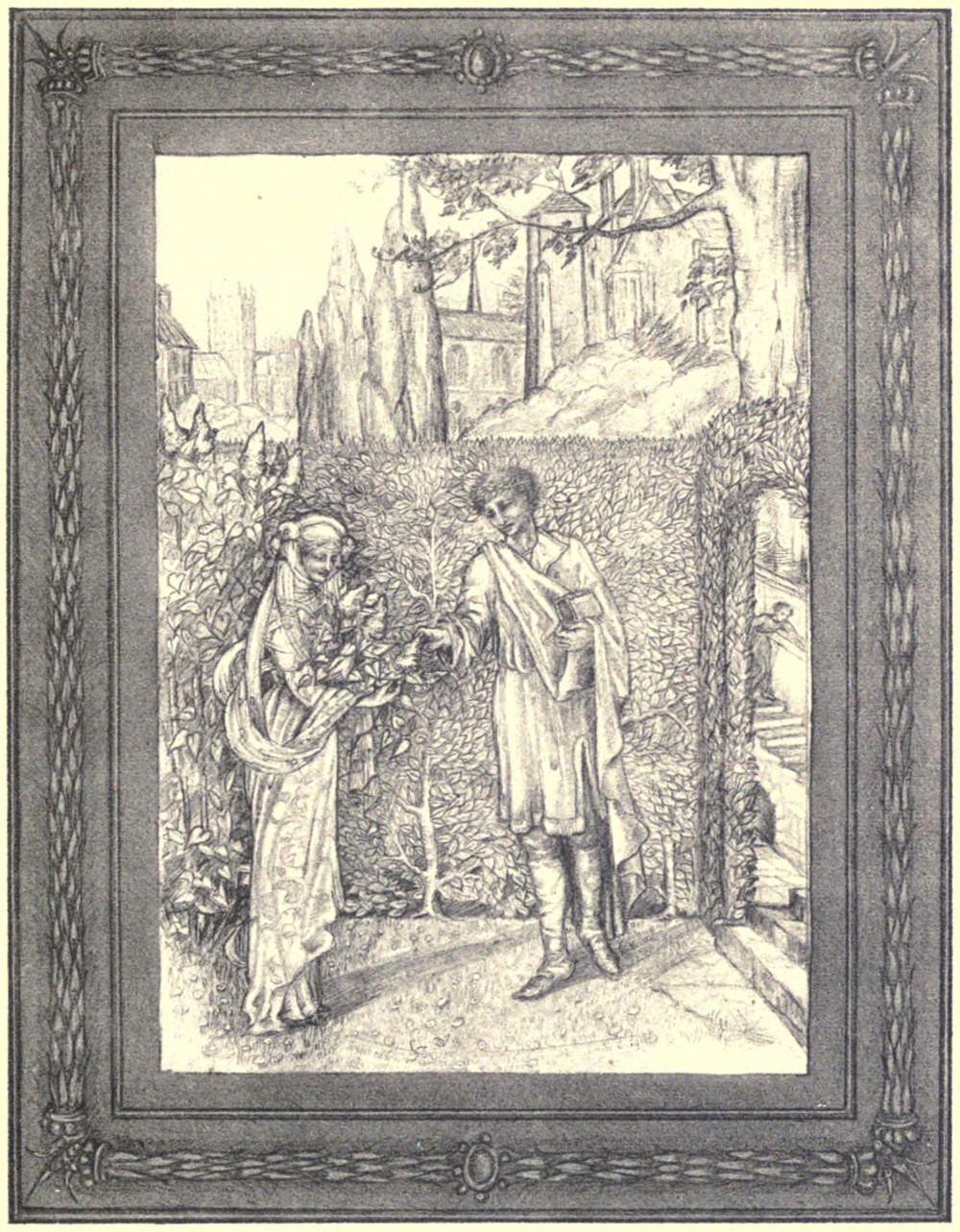Chapter XXVI.
HOW YWAIN FOUND HIS LADY IN A GARDEN.
Now in this drowsihood was Ywain living well content: and the winter passed over and the year began to stir again from under ground. And March came with dust and dryness, and then came April with sweet showers to pierce that dryness, and in the gardens the small birds were a-pairing and a-nesting busily. But Ywain was still assotted upon bells, and his mind was subdued unto the tune of them. For he forgot neither his love nor his seeking: but when he should have wept therefor he remembered them only as an old and tender tale, or as a picture of one aforetime living, but now departed where is neither hope nor striving.
So on a day he walked alone in a garden of the city, and heard a sweet sad peal of bells chiming, and mused pleasantly thereon. Then suddenly he came upon a lady that was standing on a sward of daisies, and she stood between two laylock bushes, a purple and a white, and gathered flowers of each. And her face was turned away from Ywain: but his blood moved at the sight of her, and he heard the bells no longer for a singing that was in his ears.
Then the lady looked down upon the flowers that she had gathered, and Ywain saw her face athwart, over her shoulder; and though her eyes were hid from him yet he saw well that she was his own lady. For he knew her by the turning of her neck, and by her hair, and by her ear that was like the hollow of a shell: and beside all these he knew her by a reason that was no reason but certainty. And he spoke to her by her name: and she turned her about and looked at him. And he said no more, for he was astonished dumbly, like a man awakened out of sleep.

And she said to him: Tell me somewhat of your amazement: for what came you hither seeking, if it were not that which you have found? Then he stood before her stockishly, like a thing of wood: but in his heart he went out of himself and kneeled upon his knees before her. And he said: Forgive me, for I thought to find you, but not here. And as he spoke there came into his mind the remembrance of the Queen of Chess, and of that old dame among the Maidens, and of the herd-girl in the wood of Howling: and when he saw his lady here also and in her proper shape he was bewildered suddenly. And he looked at her as at one that was past his understanding, and he cried out as in fear: What are you verily?
But she looked at him kindly, and her voice came to him as from a far distance, and she said: How shall I tell you that which I know not, seeing that I have been many things in many times? And he looked at her again and saw her strangely, as a man may see his own home by moonlight: and he cried out: Ah! lady mine and not mine! For as I think, you were a rose in Eden, and a golden child in Babylon, and a rainbow in Arcady, and a moonlight shadow on the walls of Troy: and you were loved of Tristram and of Troilus, and for you Lancelot fought and Sigurd rode the fire, and the sons of Usnach died.
And when he had so said her voice came nearer to him, and she spoke yet more kindly, and she said: Yet for all this I am your lady and your earthly friend, and I have chosen you to my servant and my fellow-pilgrim. Then she smiled and said further: But there is no pilgrim that can live by sound alone, no, nor by ordinance of others.
Then he said quickly: Must I forswear all bells for ever? And she answered him: Not so, but I shall show you reason. And she put forth her hand and showed him the flowers which she had gathered. And she showed him first the purple, and she asked him: How name you this, and of what colour? And he said: It is laylock, and the colour is the colour of laylock. Then she showed him the white and asked him again the same question. And he said: This also is laylock, but the colour of it is white. Then she looked gladly at him and a little mocking, and she said: You have well named them both. And in like manner the life of men is of the colour of life, but the life in this city is white, and though it be life after a sort, and sweet enough, yet is it no life for a man. And if it please you, we will take counsel together to depart from it: for we must still be going if we are to achieve our pilgrimage. But the time is not yet: for I come and go whither and whence I will, but you are bell-bound until the moon shall change.